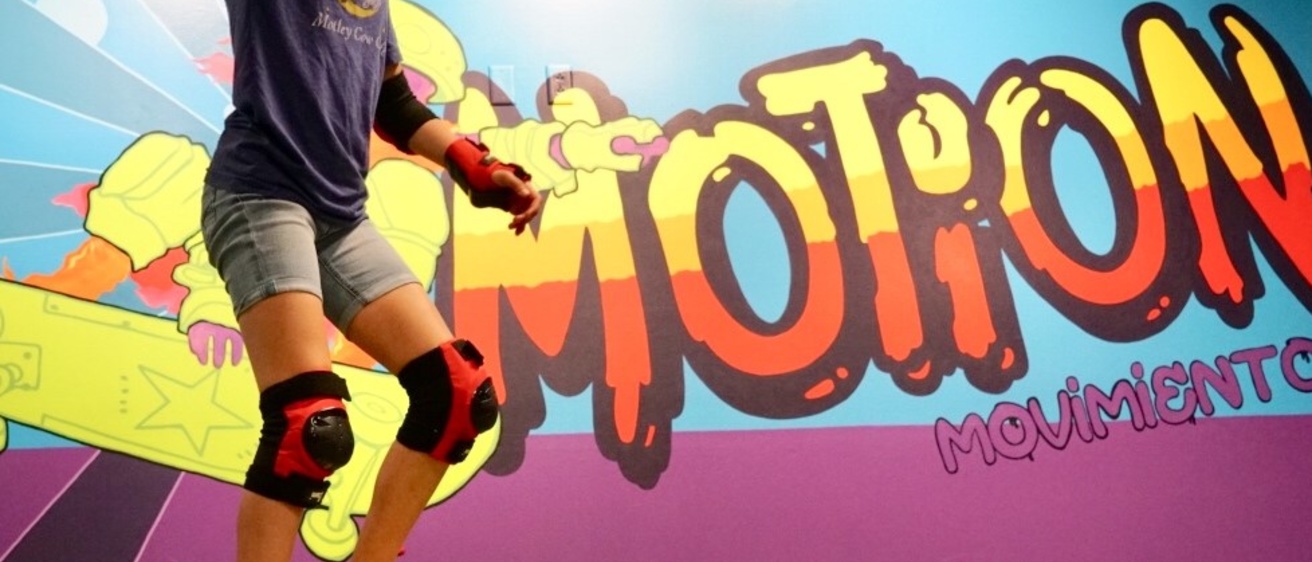By Lois J. Gray
Collaboration, creativity lead to new exhibit at The Iowa Children's Museum
Children giggled with delight as they mounted brightly colored skateboards and sleds and slid down friction hill.
This activity was just one of a half dozen opportunities to learn about physics in a new exhibit at The Iowa Children's Museum – "Notion of Motion: Science of Skateboarding" – that officially opened with a celebration and ribbon cutting ceremony on Tuesday, June 5.
The new physics-focused, game-based exhibit is funded by a three-year, nearly $1.3 million National Science Foundation grant. The ICM partnered with the University of Iowa College of Education and the University of Washington to develop the hands-on exhibit that encourages children ages five to eight to design and play their way to understanding physics.
Deb Dunkhase, executive director of The Iowa Children's Museum, serves as the principal investigator along with co-principal investigators Benjamin DeVane, assistant professor in the UI College of Education, and Kristen Missall, associate professor, University of Washington, College of Education.
You can read a related story and view a video on DeVane's research and this project.
"This exhibit took a really large collection of expertise and talent and is a true community collaboration that involved diverse interests, skill sets, and knowledge," says Dunkhase, adding that everyone from designers, professors, and retired community leaders to physicists and, perhaps most importantly, children themselves were involved in all facets of planning. "It truly took a village to bring this exhibit to fruition."
The result is a children's exhibit that will create a truly unique experience on a national scale, she says.
Dunkhase says that planning for the exhibit began in 2013. "We wanted to create something that was both innovative and meaningful to learning as well as something that was really fun and engaging for kids."
The 3,000-foot exhibit features interactive play areas where children can learn about force, mass, gravity, and energy through interactive, problem-solving opportunities. This includes a skate shop, skateboard race track, magnetic wall, modular skate park, friction hill, a rolling ball sculpture, balance boards, and game touch tables.
"All of these areas are designed to help kids gain experiential understandings of the big science concepts in skateboarding," Dunkhase says.
Missall, whose expertise is in child development and social supports for learning and engagement, says she originally got involved in the project as a museum patron with three children while she was a faculty member at the UI College of Education.
"I love this museum and this community. We came together around a shared value of civic engagement and a community-university partnership," Missall says, adding that a lot of local talent went into the creation of the exhibit. "I did not realize how unique and special this was until I started engaging with children's museum's around the country."
Missall explains that children's museums are often fabricated and purchased and do not benefit from as much local talent and contributions. "This exhibit is really unique nationally," she adds. "Kids cannot get this experience anywhere else in the country,"
DeVane, Missall, and Dunkhase will be conducting research as part of the exhibit to enhance the physical and digital learning of children through interactive play. They will also be looking at family-based and intergenerational learning since adults are encouraged to play and learn along with their children.
"Some of our research is focused heavily on how the exhibit can support parent or adult to child interaction and how adults can engage, too," Missall says.
DeVane's expertise is in learning sciences and educational psychology, specifically exploring how young people learn about science using games and digital media.
"This has been a fantastic interdisciplinary and collaborative effort between community members, researchers, very experienced children's museum practitioners and exhibit designers, and also game developers," DeVane says.
"When we think about digital learning, we often think about people alone, in front of a screen, reading, watching a video...When we think about video games, we often think about violence and addiction," DeVane says.
However, this exhibit is all about ways to engage with digital learning that is more interactive and positive.
DeVane says he and others have partnered with a game development team "to create a game-based learning environment that we hope is about thoughtful and reflective creation of physics-based learning environments."
"What we're trying to do with this game is to have a complementary learning activity to real-world physics learning that occurs in the exhibit elements at The Iowa Children's Museum," DeVane says. "We're also trying to have a collaborative and creative learning activity where you're making things, you're tinkering with the physics, and you're exploring the world."
The exhibit is specifically funded by the Applied and Informal Science Learning, or AISL, a division of the NSF, that funds projects that operate in the informal worlds of learning – museums, zoos, parks, aquariums, science centers, cultural centers, and more.
A number of distinguished guests and supporters attended the official exhibit launch, including the following: Coralville Mayor John Lundell; representatives from the Iowa City Area Chamber of Commerce; external advisory board members Steve Gennrich, from The Exploratorium in San Francisco, who served as the project manager, and Ashima Shah from the PEAR Institute: Partnerships in Education and Resilience at Harvard University; External Grant Evaluator James Shymansky from Washington University in St. Louis; and Iowa Children Museum Board Members Anne Rierson, Frontier; Matt Seberger, General Mills, and Nancy Pacha, Iowa City Community School District retired educator; and Saba Ali, the UI College of Education Associate Dean for Research, among others. Other external advisory board members were from the UI DeLTA Center, and Northwestern and Temple Universities.
